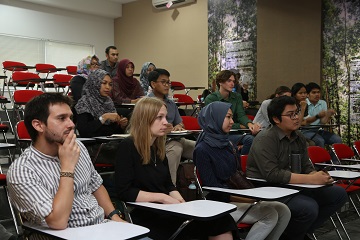Guest Lecture at IPB: the Planted of Jengkol and Petai Trees for Biodiversity Restoration of Oil Palm Plantations

Students of the Department of Forest Management, of the Faculty of Forestry, of Bogor Agricultural University (FAHUTAN IPB) learned biodiversity from German researchers in her Guest Lecture at Tanoto Foundation Building, IPB Campus, Dramaga, on 16 April 2018. The Guest Lecturer invited was Dr. Delphine Clara Zemp from the University of Goettingen Germany, who talked on “Biodiversity Enrichment in Oil Palm Plantation: Ecological and Socio Economic Impact”.
Dr. Delphine Clara Zemp and her two colleagues, namely Johanna Ruth Kuckes and Darlyn Alejandra Vades Uribe, carried out research project in Jambi. Dr. Clara Zemp revealed that six trees (durian, petai (Parkia speciosa), jengkol (Archidendron pauciflorum), meranti (Shorea spp), sungkai wood (phenomena cancascen jack), jelutung (Dyera costulata) or sap-producing trees) were appropriate trees to restore the function biodiversity and ecosystems in oil palm plantations. Oil palm plantations can be made more hospitable to biodiversity by planting indigenous trees inside the plantations. To examine the feasibility of planting for biodiversity restoration, those six seedlings of various species were planted along in an oil palm plantation.
"Three aspects were studied, namely biophysical processes, land, and biodiversity and socio-economic aspects. We established experimental tree islands in a. conventional oil-palm plantation and systematically varied plot size, tree diversity, and tree species composition in Jambi," she said.
It had been the collaborative research between German and Indonesian researchers. More than 50 researchers of IPB involved in this research project, they were from various Faculties.
Dr. Ir. Leti Sundawati, M.Sc.F.Trop, the Secretary of the Department of Forest Management of FAHUTAN IPB explained, that the research project was part of Collaborative Research Center (CRC) consortium, the Indonesia and Germany Cooperation Program. The Indonesian side includes IPB, Jambi University and Tadulako University, Palu. The location of the research project had been in Jambi, that consisted of various sub projects.
"This research project was carried out jointly with private companies in Jambi. The experimental unit consists of 54-tree plots scattered in the palm oil plantations. The palm plantation is about 200 hectares. The plots are spread over 50 hectares systematically spaced. We established experimental tree islands in a conventional oil-palm plantation and systematically varied plot size, tree diversity, and tree species composition. They named them Island Planting. Here, we describe the rationale and the design of the experiment, the ecosystem variables (soil, topography, canopy openness) and biotic characteristics (associated vegetation, invertebrates, birds) of the experimental site prior to the establishment of the experiment, and initial experimental effects on the fauna," she said. (Wied)



